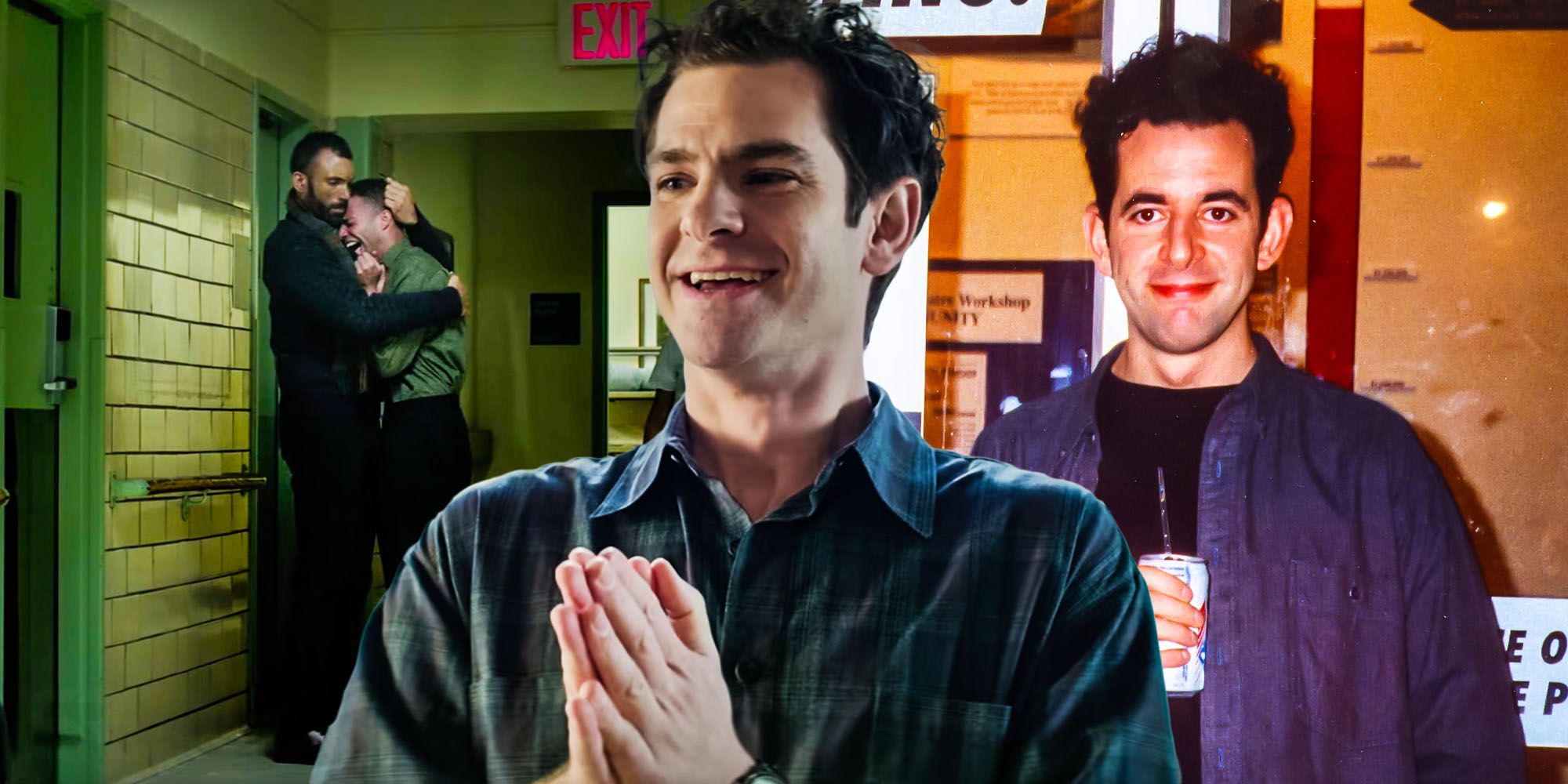Warning: SPOILERS for Tick, Tick...Boom! below.
Movie musical Tick, Tick… Boom! explores Jonathan Larson’s pursuit of passion and success amidst a self-imposed timeline — here is what the ending means, especially regarding his legacy. Tick, Tick… Boom! is based on the semi-autobiographical rock monologue written and performed by gone-too-soon playwright Jonathan Larson. The film follows Jon before creating Rent, as he experiences an internal crisis of turning 30 and not having accomplished anything.
Known for his critically-acclaimed musicals In The Heights and Hamilton, Lin-Manuel Miranda made his directorial debut in Tick, Tick… Boom!. Andrew Garfield leads the cast, playing Jonathan Larson himself, and he is joined by Alexandra Shipp, Robin de Jesús, Vanessa Hudgens, Joshua Henry, Judith Light, Jonathan Marc Sherman, and Bradley Whitford. There are also numerous Broadway stars who appeared in cameos throughout the film.
Prior to its streaming release on Netflix, Tick, Tick… Boom! has received mostly positive reviews, praising the cast’s performance, especially Garfield’s, and Miranda’s directorial approach and style. Despite some critics arguing that some of its characters are underutilized, the musical still manages to capture the mess and process of leading a creative life. Here is the ending of Tick, Tick… Boom! explained, diving into the life, death, and legacy of Jonathan Larson.
Tick, Tick... Boom! True Story: How Much Is Real?
At the beginning of Tick, Tick… Boom!, Andrew Garfield’s character Jonathan introduces himself, and the narrator claims that the succeeding events are true, except for the parts that he made up. The film’s core conflict lies in Jon’s emotional turmoil with his impending 30th birthday. He has spent the last eight years working on his dystopian science-fiction musical Superbia, and while it did get a workshop at the Playwrights Horizons as shown in the film, nobody has expressed their interest in producing it. This disappointment leads him to pen Tick, Tick… Boom!, but in real life, the musical is a monologue. Meanwhile, the version shown in the film is already the revamped three-actor piece, created by Pulitzer Prize winner David Auburn shortly after Larson’s death in 1996.
In the film Tick, Tick… Boom!, Jon’s dismay over his failure is only alleviated by Stephen Sondheim’s praise. This occurs years after the two meet at a BMI Workshop, where Sondheim, known for his classic musicals West Side Story and Into the Woods, acted as a panelist on Jon’s unfinished Superbia script. In reality, Larson and Sondheim’s relationship started when the former was still in college when he sent a letter to the musical theater icon. To his surprise, Larson received a reply, which would then spark a lifelong mentor-mentee relationship. Over the years, Sondheim encouraged Larson to network with other composers, so he could gain confidence in his work. Larson would also receive recommendation letters to get development readings on his musicals. The two’s last conversation was a month before Larson’s untimely death.
Jonathan Larson's Death & What Happens After Tick Tick Boom's Ending
Tick, Tick… Boom! focused heavily on Jonathan’s crisis as he turns 30; unfortunately, he would suddenly pass away five years later. This was briefly touched on in Lin-Manuel Miranda’s movie — the irony of Jonathan worrying about wasting his life and chasing his dreams before his time is up, only to receive immense posthumous success. During the rehearsals for Rent’s off-Broadway production, Jonathan experienced severe chest pains and shortness of breath, but since his test results came back normal, his doctors misdiagnosed it as flu, or simply a result of stress. However, in a tragic twist of events, he died on the day of Rent’s first performance, suffering from an aortic aneurysm.
Rent went on to become one of the longest-running shows on Broadway, running for 12 years and grossing over $280 million. The production also snatched four Tony Awards, six Drama Desk Awards, and a Pulitzer Prize for Drama. This popularity and acclaim established Rent as the musical that revolutionized the modern genre, launching the musical careers of artists like Idina Menzel, since known for voicing Elsa in the Frozen franchise. It also inspired local and international productions and earned a massive following and countless pop culture references.
What Happened To Michael After Tick, Tick... Boom!'s Ending
To fully give justice to Jonathan Larson’s life and legacy, Miranda and screenwriter Steven Levenson conducted thorough research at the Jonathan Larson Archives at the Library of Congress. They managed to obtain the four different versions of Tick, Tick… Boom! script. Additionally, they visited and interviewed Larson’s collaborators and closest friends, including Matt O’Grady, who was the inspiration behind Jon’s friend, Michael.
Similar to the friendship described in the film, Matt is Jonathan’s best friend since childhood. His being diagnosed as HIV-positive in the early ‘90s, along with their close friends dying from AIDS, further awakened Jon’s sense of urgency, fearing that life is truly short and could be taken away anytime. Fortunately, Matt never developed AIDS and is still alive to this day. He even watched the In The Heights creator play Jon in an Encores! production of Tick, Tick… Boom!.
Why Rent Is A Success (And Superbia Isn't)
Rent is largely considered to be Jonathan Larson’s magnum opus, loosely based on Giacomo Puccini's La Bohème. Set against the backdrop of the HIV/AIDS epidemic in New York, the musical explores the story of a group of young artists struggling to make ends meet, tackling unconventional themes and social taboos. However, despite Rent's overwhelming success, Larson had an unrealized project that took up almost a decade of his life, Superbia.
Originally, Superbia was a rock retelling of George Orwell’s cautionary novel Nineteen Eighty-Four. Larson even intended for his musical to be staged in the very year of 1984 — this was successfully executed by Michael Radford’s 1984 film adaptation. However, the Orwell estate forbade him from directly adapting the novel, so he deviated from the themes presented in the book.
Instead, as Jon explained in the film Tick, Tick… Boom!, Superbia is a satire set in a distant emotionless, poisoned future, where “the vast majority of humanity spend their entire lives just staring at the screens of their media transmitters, watching the tiny elite of the rich and powerful, who film their own fabulous lives like TV shows.” The concept is eerily familiar to the current state of humanity and the kind of entertainment consumed, hinting at reality TV shows like Keeping Up With The Kardashians. But at the time, the idea of a far-fetched future where people behave differently might have seemed off-putting for producers; not to mention, even the performers in Superbia’s workshop, led by Princess Switch’s star Vanessa Hudgens, struggled to understand what they were singing about. Although Superbia is Larson's attempt at bringing social relevance into Broadway, Rent is more grounded, dealing with immediate concerns and reflecting real-life struggles. As it managed to combine Broadway tradition and contemporary music, Rent both attracted and represented younger generations who yearn for their voices to sing and be heard. It seemed like Jon truly followed Rosa’s advice to write about what he knows, as there are themes and elements in Rent which are derived from his life.
The Real Meaning Of Tick, Tick… Boom!'s Ending
Despite knowing that Jonathan Larson would die a few years after the film’s setting, the movie ends on an optimistic note, with Larson soon to begin writing his next musical, having been rejected and encouraged over and over again. Apart from showcasing the messy and sometimes draining process of creating musicals, Tick, Tick… Boom! is a celebration of every artist’s perseverance and creativity. The “starving artist” lifestyle that emanates from an obsessive relationship with one’s craft has always been looked down on, with people simply dismissing it as a phase, a hobby, or a waste of time. Consequently, it is easy for artists to downplay their relevance in the world, especially if, as time passes by, they only get older, but they have nothing concrete or practical to show for it. But Tick, Tick… Boom! reminds its audience that art shapes and changes the world, outliving everything and everyone else, including the artists themselves. Jonathan Larson might not have seen how influential he became in the genre of musical theater, but his musical served as his successful attempt to wake up the succeeding generations, which he continued with Rent. Furthermore, Tick, Tick… Boom! sends tired artists and confused young adults an “I see you” message — a pat on their backs, pushing them to continue living in, through, and for art.






